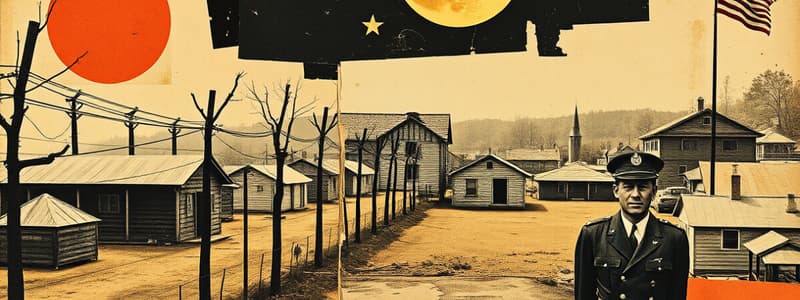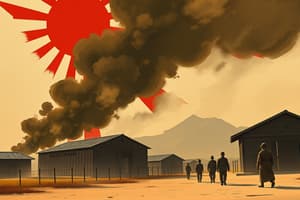Podcast
Questions and Answers
What significant conference involved the leaders of the U.S., U.K., and the Soviet Union in planning the future of Europe and dividing Germany into occupation zones?
What significant conference involved the leaders of the U.S., U.K., and the Soviet Union in planning the future of Europe and dividing Germany into occupation zones?
- The Munich Conference
- The Potsdam Conference
- The Yalta Conference (correct)
- The Paris Peace Conference
Which event is considered a direct trigger for the beginning of the Cold War?
Which event is considered a direct trigger for the beginning of the Cold War?
- The Berlin Airlift
- The fall of the Berlin Wall
- The Potsdam Conference (correct)
- The signing of the Nuclear Test Ban Treaty
What doctrine was established to stop the spread of communism in Eastern Europe?
What doctrine was established to stop the spread of communism in Eastern Europe?
- The Marshall Plan
- The Eisenhower Doctrine
- The Truman Doctrine (correct)
- The Monroe Doctrine
Which leader of the Soviet Union initiated reforms and played a key role during the later years of the Cold War?
Which leader of the Soviet Union initiated reforms and played a key role during the later years of the Cold War?
How did Winston Churchill describe the division between Eastern and Western Europe in his famous speech?
How did Winston Churchill describe the division between Eastern and Western Europe in his famous speech?
What was the significance of the Iron Curtain during the Cold War?
What was the significance of the Iron Curtain during the Cold War?
What was the major outcome following the fall of the Berlin Wall in 1989?
What was the major outcome following the fall of the Berlin Wall in 1989?
Which policy did the U.S. employ to prevent the spread of communism during the Cold War?
Which policy did the U.S. employ to prevent the spread of communism during the Cold War?
What did John F. Kennedy's Flexible Response strategy aim to achieve?
What did John F. Kennedy's Flexible Response strategy aim to achieve?
What event led Congress to pass the Gulf of Tonkin Resolution in 1964?
What event led Congress to pass the Gulf of Tonkin Resolution in 1964?
What was the main reason for Japanese Internment during World War II?
What was the main reason for Japanese Internment during World War II?
Which Executive Order allowed for the internment of Japanese Americans?
Which Executive Order allowed for the internment of Japanese Americans?
What significant project was initiated prior to America's entry into World War II to develop an atomic bomb?
What significant project was initiated prior to America's entry into World War II to develop an atomic bomb?
What was a consequence of dropping the atomic bombs on Hiroshima and Nagasaki?
What was a consequence of dropping the atomic bombs on Hiroshima and Nagasaki?
What action did Ronald Reagan take concerning Japanese internment camp survivors?
What action did Ronald Reagan take concerning Japanese internment camp survivors?
What did the 24th Amendment accomplish?
What did the 24th Amendment accomplish?
How did the assassination of top leaders affect the Civil Rights Movement?
How did the assassination of top leaders affect the Civil Rights Movement?
Which event is considered the beginning of the first wave of feminism in the United States?
Which event is considered the beginning of the first wave of feminism in the United States?
What was the primary focus of the New Left movement in the 1960s?
What was the primary focus of the New Left movement in the 1960s?
What major inequality did the poll tax perpetuate among voters?
What major inequality did the poll tax perpetuate among voters?
What impact did grassroots efforts have during the civil rights movement of the 1960s?
What impact did grassroots efforts have during the civil rights movement of the 1960s?
Which book is credited with igniting the second wave of feminism?
Which book is credited with igniting the second wave of feminism?
What was a consequence of the Watergate Scandal?
What was a consequence of the Watergate Scandal?
What marked the shift in the women's rights movement after the first wave?
What marked the shift in the women's rights movement after the first wave?
Flashcards are hidden until you start studying
Study Notes
Japanese Internment and WWII
- Following Japan's attack on Pearl Harbor on December 7, 1941, anti-Japanese sentiments surged in the U.S.
- Japanese Americans were forcibly removed from their homes and detained in internment camps under Executive Order 9066 issued by President Franklin D. Roosevelt.
- Rights of Japanese Americans were stripped, leaving them defenseless against the government's actions.
- Internment camps had poor living conditions, lacking basic necessities like running water and privacy.
- In 1988, President Ronald Reagan authorized reparations for internment camp survivors, including an apology and $20,000 compensation.
The Manhattan Project and Atomic Bombs
- The Manhattan Project was initiated prior to the U.S. entry into WWII, aiming to develop an atomic bomb after discovering Nazi Germany's uranium research.
- First successful atomic bomb test occurred in 1945; by this time, Germany had surrendered, but Japan remained defiant.
- President Harry Truman decided to drop atomic bombs on Hiroshima and Nagasaki to force Japan's surrender, averting an invasion that could cost millions of U.S. lives.
- The bombings resulted in approximately 120,000 immediate deaths, with long-term health consequences due to radiation exposure.
- VJ Day was declared, signaling the end of WWII in the Pacific, but debates over the morality of using atomic bombs persist.
Allied Conferences and Post-War Planning
- Key conferences, including the Atlantic Charter and the Yalta Conference, established Allied war aims and post-war Europe’s structure.
- At the Yalta Conference, leaders divided Germany into four occupation zones and discussed the Soviet Union's influence in Eastern Europe.
- The Potsdam Conference issued an ultimatum to Japan and emphasized the allied powers' shifting relationships post-war.
The Cold War Era
- The Cold War (1945-1991) featured intense rivalry between the Soviet Union and the United States, influencing global politics and society.
- Conferences such as Potsdam and Yalta triggered tensions that led to the Cold War.
- The Truman Doctrine aimed to contain communism in Eastern Europe, resisting Soviet influence.
- Important institutions like NATO emerged in 1949, uniting Western powers against common threats.
- The Vietnam War exemplified Cold War proxy conflicts, with Communist North Vietnam backed by the USSR and China against U.S.-supported South Vietnam.
The Iron Curtain
- The Iron Curtain symbolized the division between democratic and Communist states, stretching from the Baltic Sea to the Adriatic Sea.
- Communist governments were established in Eastern Europe despite initial promises for free elections made by Joseph Stalin.
- The term was popularized by Winston Churchill in a speech stating an “iron curtain” had descended across Europe.
- The Berlin Wall, erected in 1961, physically represented this division until its fall in 1989, leading to the dissolution of the Soviet Union in 1991.
McCarthyism and Internal Politics
- The policy of containment compelled the U.S. to prevent Communism's spread domestically, leading to a climate of fear and suspicion known as the Second Red Scare.
- FBI director J. Edgar Hoover investigated suspected Communist sympathizers, focusing especially on labor unions as potential threats.
- Joseph McCarthy fueled paranoia, leading to investigations and accusations that turned citizens against one another.
John F. Kennedy and Foreign Policy
- JFK's presidency was marked by significant Cold War tensions, highlighted by the Bay of Pigs invasion and the Cuban Missile Crisis.
- Kennedy's New Frontier policies sought to address domestic and international issues, emphasizing civil rights and anti-communism.
- The Flexible Response strategy was designed to allow a range of military responses to communist actions, aiming to avoid full-scale nuclear conflict.
Civil Rights Movement
- Aimed at ending racial segregation and discrimination against African Americans, significant events included the Brown v. Board of Education ruling and the Montgomery bus boycott.
- Activism faced considerable resistance, including violence against leaders, yet led to pivotal civil rights legislation.
- The movement’s accomplishments included legal protections against discrimination and increased public awareness of racial injustices.
Voting Rights and Poll Tax
- Poll taxes were used to disenfranchise African American voters, as they disproportionately affected those with fewer economic resources.
- The 24th Amendment, ratified in 1964, abolished poll taxes in federal elections, supporting the Civil Rights Movement's progress.
Student Activism of the 1960s
- Post-WWII student activism flourished in response to social injustices, the Vietnam War, and a desire for more equitable policies.
- The Free Speech Movement, founded by Marco Savio, protested restrictions on political expression at universities.
- The 1960s saw a split in student activism, with some groups adopting radical methods, leading to tensions and fragmentation within the movement.
Women's Rights Movement
- The women's rights movement evolved through waves, starting with the first wave focused on suffrage, leading to the 19th Amendment in 1920.
- The second wave, spurred by Betty Friedan's "The Feminine Mystique," sought broader equality and was characterized by diverse factions with varying ideologies.
- The Equal Rights Amendment faced opposition and was never ratified, showcasing divisions within the movement.
Watergate Scandal
- The Watergate scandal involved illicit activities by President Richard Nixon's administration, aiming to gain an advantage in the 1972 elections.
- Arrests during efforts to fix improperly installed surveillance equipment led to widespread investigations and revelations about Nixon's involvement.
- Nixon’s presidency ended in controversy following attempts to cover up the scandal, including the dismissal of a special prosecutor in an event known as the Saturday Night Massacre.### Watergate Scandal and Nixon
- The Supreme Court ruled in U.S. v. Nixon that a president cannot invoke executive privilege to obstruct a criminal investigation.
- Nixon was forced to release tapes, one of which served as conclusive evidence of his involvement in the Watergate cover-up.
- Impeached and resigned, Nixon was later pardoned by Gerald Ford.
- Nixon's prior attempt to suppress the Pentagon Papers marked his initial foray into using power to control sensitive information.
Gerald Ford's Presidency
- Gerald Ford assumed the presidency without being elected as either president or vice president.
- He aimed to stabilize the economy and bring healing post-Watergate by pardoning Nixon, a decision that initially made him unpopular.
- Ford was criticized for a poor grasp of foreign policy and failure to effectively reduce inflation during his presidency.
- His unpopularity facilitated Jimmy Carter's successful campaign, representing a shift from conservatism.
Jimmy Carter and his Domestic Policies
- Served as the 39th president from 1977 to 1981; former peanut farmer and governor of Georgia.
- Proposed progressive energy policies during the energy crisis but faced legislative rejection.
- Achieved significant foreign policy success with the Camp David Accords, fostering peace between Egypt and Israel.
- Lost reelection in 1980 primarily due to economic challenges and the Iran hostage crisis.
1980 Presidential Election
- Marked the end of an era where the Democratic Party held a primary with an incumbent candidate (Carter).
- Main opposition came from Republican Ronald Reagan, whose platform promised economic deregulation, military funding increases, and tax cuts.
- Reagan's campaign resonated with middle-aged white males and the New Right movement, leading to a significant electoral victory (489 electoral votes for Reagan versus 49 for Carter).
Ronald Reagan's Foreign Policy
- Focused heavily on Cold War tensions and aggressive stances against the Soviet Union, viewing Carter's policies as weak.
- Introduced the Reagan Doctrine, aimed at reducing communism and supporting anti-communist movements globally.
- Oversaw the implementation of the Strategic Defense Initiative (SDI) for missile defense against the Soviet threat.
- Ended his presidency amidst controversy due to the Iran-Contra Affair, revealing secret arms sales and funding of rebel groups.
George H.W. Bush's Presidency
- Served from 1989 to 1993, overseeing the last years of the Cold War.
- Preferred a diplomatic approach but had to engage militarily in situations like the Panama invasion and Operation Desert Storm against Iraq.
- Sought to create a "New World Order" for international stability but faced challenges both domestically and abroad.
1992 Presidential Election
- Featured incumbent George H.W. Bush versus Bill Clinton and Ross Perot; economic issues were pivotal.
- Clinton's victory signified a generational shift in political power, despite not winning the popular vote by a majority.
Bill Clinton's Domestic and Foreign Affairs
- Focused on domestic policy but engaged in multiple international conflicts and diplomatic efforts.
- Notable actions included military intervention in Haiti and negotiations in the Balkans, while also grappling with crises in North Korea and Rwanda.
- Faced scandal and impeachment related to perjury in the Monica Lewinsky case but remained in office.
2000 Presidential Election
- Highly contested election between Al Gore and George W. Bush, with Bush winning despite losing the popular vote.
- Election outcome hinged on a Supreme Court decision regarding Florida vote counts.
George W. Bush's Domestic Policies
- Implemented significant tax cuts and education reforms through the No Child Left Behind Act but began his term with broken campaign promises.
- His presidency faced major challenges, including rising unemployment and federal debt, leading to the Omnibus Budget Reconciliation Act with increased taxes.
- Achieved notable legislation such as the Americans with Disabilities Act, but foreign policy overshadowed his domestic achievements.
Challenges during George W. Bush's Second Term
- Marked by controversy over responses to Hurricane Katrina and the Iraq War, leading to declining public support.
- Significant initiatives like Medicare modernization and TARP introduced but failed to prevent economic challenges leading up to the Great Recession.
Studying That Suits You
Use AI to generate personalized quizzes and flashcards to suit your learning preferences.




